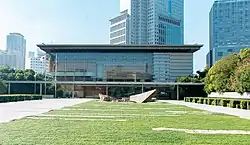| 国家安全保障会議 Kokka-anzen-hoshō-kaigi | |
 | |
 The Prime Minister's official residence where the National Security Council is established | |
| Agency overview | |
|---|---|
| Formed | December 4, 2013 |
| Preceding agency | |
| Headquarters | 2-3-1 Nagata-chō, Chiyoda-ku, Tokyo, Japan |
| Agency executives |
|
| Parent agency | Cabinet of Japan |
| Child agency |
|
| Website | kantei.go.jp |
The National Security Council (NSCJ, Japanese: 国家安全保障会議; Hepburn: Kokka anzen hoshō kaigi) is the principal Japanese national security and intelligence forum used by the Prime Minister and senior advisors for coordinating security and defence policies for Japan.
It was formed in 2013 as an initiative for the late former Prime Minister Shinzo Abe to replace the obsolete Security Council,[1] and to centralize information management.[2] The NSCJ was officially established on 4 December 2013, following the passing of the law establishing the National Security Council on 27 November 2013.[3]
The council is headed by a member of the National Security Secretariat, a department within the Cabinet Secretariat. The National Security Advisor serves as the Director-General of the Secretariat and is the overall highest authority in the council other than the Prime Minister.[4]
History
Abe first attempted to establish an NSC in his first premiership in 2006–07, but the effort stalled in January 2008 when he stepped down from office.[5][1][6] The House of Representatives passed a bill to establish the Council on 7 November 2013,[7] and the House of Councillors followed suit on 27 November.[8]
The Council has its own national security advisor to the Prime Minister,[8] and is staffed by around 60 officials from the Foreign and Defense ministries.[9] There are six teams handling various issue areas, each headed by an official equivalent to a ministerial division chief.[10] One of its key functions is a regular conference with the Prime Minister, the Chief Cabinet Secretary, and the Foreign and Defense ministers.[5] The office has hotlines to its American and British counterparts.[11]
Together with the publication of Japan's first National Security Strategy in December 2013, the NSC represents a centralization of Japanese security policy with the Prime Minister.[5] The old Security Council had been beset by bureaucratic inefficiencies and lack of coordination.[1] The National Security Strategy advocates for the creation of an NSC because "the security environment surrounding Japan is further increasing in severity. ... [I]t is necessary for the entire Cabinet to work on the strengthening of foreign affairs and the security system of Japan."[6]
The Council met for the first time on 4 December 2013 to discuss the National Security Strategy and China's Air Defense Identification Zone.[11]
Membership
The National Security Council, as of 2021, consists of nine statutory members; the Prime Minister, the Minister of Finance, Minister for Internal Affairs and Communications, Minister for Foreign Affairs, Minister of Economy, Trade and Industry, Minister of Land, Infrastructure, Transport and Tourism, the Chief Cabinet Secretary, and the Chairman of the National Public Safety Commission. The council is chaired by the Prime Minister and is managed by the Director-General of the National Security Secretariat.
Although it is not mandated, the Chief of Staff, Joint Staff, Deputy Chief Cabinet Secretaries, and several Vice-Ministers also attend the council.
References
- 1 2 3 Alexander Martin (21 November 2013). "Japan to Form Own National Security Council". The Wall Street Journal. Retrieved 4 February 2014.
- ↑ "Abe to take on intel-gathering taboos | the Japan Times". 11 May 2013. Archived from the original on 2020-11-23.
- ↑ "Japan Launches Its Own National Security Council". Nippon.com. 25 December 2013. Retrieved 1 July 2023.
- ↑ "Readout of Secretary of Defense Chuck Hagel's Meeting with Japan National Security Advisor Shotaro Yachi" (Press release). U.S. Department of Defense. 17 January 2014. Retrieved 6 February 2014.
- 1 2 3 J. Berkshire Miller (29 January 2014). "How Will Japan's New NSC Work?". The Diplomat. Retrieved 4 February 2014.
- 1 2 "Defense of Japan" (PDF). Ministry of Defense (Japan). 17 December 2013. p. 105. Retrieved 4 February 2014.
- ↑ "Japan's lower house OKs bill to set up NSC". Xinhua News Agency. 7 December 2013. Archived from the original on December 8, 2013. Retrieved 4 February 2014.
- 1 2 "Japanese 'NSC' scheduled to be launched next week". Yomiuri Shimbun. Asian News Network. 28 November 2013. Archived from the original on 28 November 2013. Retrieved 4 February 2014.
- ↑ "Japan launches U.S.-style National Security Council". Xinhua News Agency. 4 December 2013. Archived from the original on December 9, 2013. Retrieved 4 February 2014.
- ↑ Katsuhisa Kuramae (8 January 2014). "New national security bureau faces rocky start". The Asahi Shimbun. Archived from the original on 25 January 2014. Retrieved 6 February 2014.
- 1 2 "Japan's NSC meets for first time, with ADIZ issue on agenda". Xinhua News Agency. 4 December 2013. Archived from the original on 21 February 2014. Retrieved 4 February 2014.
Further reading
- Fukushima, Mayumi; Samuels, Richard J. (1 July 2018). "Japan's National Security Council: filling the whole of government?" (PDF). International Affairs. 94 (4): 773–790. doi:10.1093/ia/iiy032. ISSN 0020-5850.
- Liff, Adam P. (4 May 2018). "Japan's National Security Council: Policy Coordination and Political Power" (PDF). Japanese Studies. 38 (2): 253–279. doi:10.1080/10371397.2018.1503926. ISSN 1037-1397. S2CID 150248298.